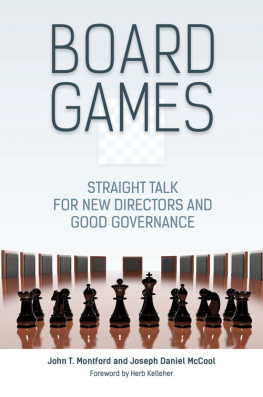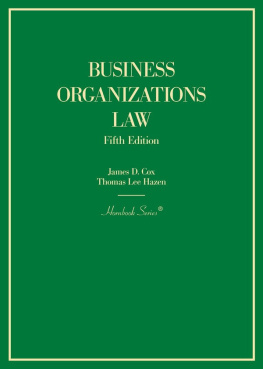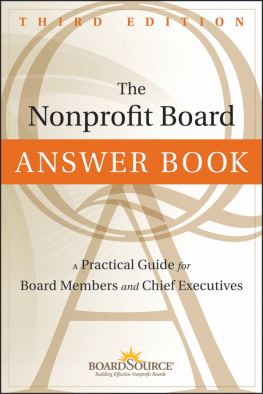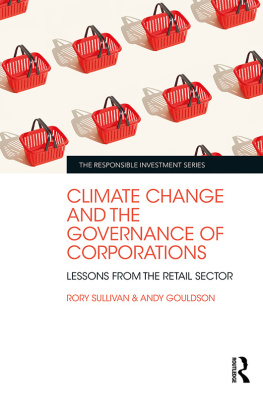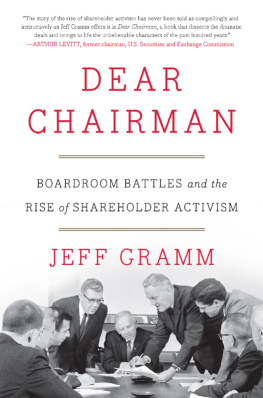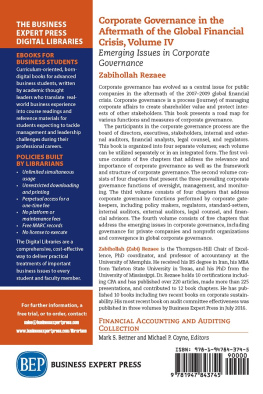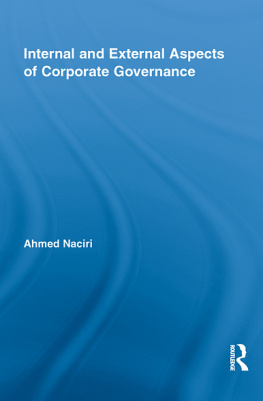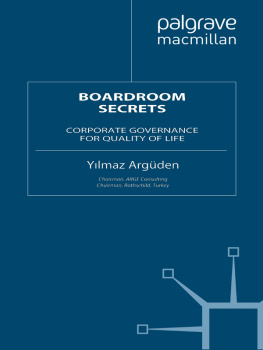THE FISH ROTS FROM THE HEAD
BOB GARRATT is a pracademic and international consultant on board evaluation and development, corporate governance and strategic thinking through his company Garratt Learning Services Ltd. He has chaired boards in the UK and Hong Kong and with his wife, Sally, consults on five of the six continents. He is a Visiting Professor at Cass Business School, London and Professor Extraordinaire, University of Stellenbosch Business School, South Africa, where he is Chairman of the Unit for Corporate Governance in Africa. He was a founder member of the Commonwealth Association for Corporate Governance, Visiting Professor at the Tanaka Business School, Imperial College, London, and Senior Associate at the Judge Institute of Management, University of Cambridge. He helped found the Chinese European Management Programme in Beijing in 1983, which led to the first Chinese MBA programme. He was also a founder member of the ASEAN-European Management Centre in Brunei in 1992. His clients have included the IMF in Washington, the Saudi Arabian Monetary Authority and the Public Investment Corporation of South Africa, along with many public, private and not-for-profit companies. He is an External Examiner of the Institute of Directors in London where he helped create the Chartered Director award. He is Past Master of the Worshipful Company of Management Consultants, and a Freeman of the City of London. His previous books include The Learning Organisation, Twelve Organisational Capabilities: Valuing People At Work, Developing Strategic Thought (editor) and Thin On Top: Why Corporate Governance Matters.
THE FISH ROTS FROM THE HEAD
Developing Effective Boards
Third edition
BOB GARRATT
This third edition published in 2010 by
PROFILE BOOKS LTD
3A Exmouth House
Pine Street
Exmouth Market
London EC1R 0JH
www.profilebooks.com
First published in Great Britain by HarperCollinsBusiness 1996
Revised and updated in 2003 and 2010
Copyright Bob Garratt 1996, 2003, 2010
1 3 5 7 9 10 8 6 4 2
Typeset in Sabon by MacGuru Ltd
info@macguru.org.uk
Printed and bound in Great Britain by
Bookmarque Ltd, Croydon, Surrey
The moral right of the authors has been asserted.
All rights reserved. Without limiting the rights under copyright reserved
above, no part of this publication may be reproduced, stored or introduced
into a retrieval system, or transmitted, in any form or by any means
(electronic, mechanical, photocopying, recording or otherwise), without
the prior written permission of both the copyright owner and the publisher
of this book.
A CIP catalogue record for this book is available from the British Library.
ISBN 978 1 84668 329 9
eISBN 978 1 84765 050 4

In memory of Christopher Lorenz
List of figures
List of tables
Acknowledgements
In the first two editions I listed the many people who helped me with the book (see Appendix 4). I am happy to say that we are still in touch and working on the big issues. For the third edition I would like to acknowledge the constructive and sometimes robust criticism of my colleagues at two institutions. At Cass Business School in London I must mention Georges Selim, Igor Filatotchev, Chizu Nakajima, Paul Palmer and Chris Pierce. At the Unit for Corporate Governance, University of Stellenbosch, South Africa, Daniel Malan, Thina Siwendu, Lynn McGregor, Victor Prozesky, Deon Botha and Eon Smit have been hugely supportive as has our colleague Stephen Davis at the Millstein Centre, Yale University. For my board review and development work in South Africa, Fred Phaswana, now chairman of Standard Bank, Maria Ramos, now chief executive of ABSA, Lindie Englebrecht of the Institute of Directors Southern Africa and Richard Foster, company secretary of Old Mutual, have been especially helpful. In the public sector I have been helped greatly by Bill Moyes, Stephen Hay and Robert Harris of Monitor, Jane Tomkinson and Stephen Cross of the Countess of Chester Hospital, and Vicky Pryce of the Department of Business, Innovation and Skills. My particular thanks go to Nick Anstee, Lord Mayor of the City of London 200910, with whom I am working on the issue of restoring the credibility of the City of London through the creation of values and consequent trust. Many thanks also to copyright holders who have allowed me to reproduce their material in this book. For a list see page 314.
In the production of the book I want to thank Sally Garratt, marital and professional partner, who gave unstinting emotional and technical support during those times of utter frustration (I am not a completer/finisher) which allowed the details to be checked and polished. Penny Williams was the highly professional and tolerant copy-editor who saw me through this tricky process and produced a text that flatters my often clunky writing style. But most of all my thanks go to Stephen Brough of Profile Books who took the risk of publishing this third edition; and to Lucinda McNeile who took the initial risk those 15 years ago.
Preface
This third edition created two main problems for me as author. First, it is written at a time of major public demands on, and criticism of, corporate governance. Corporate governance is seen by many as a magical silver bullet when the consequences of the global credit and debt crises are still developing and unnerving. It is not. However, it has a major role to play, so legislative and conduct code responses are proliferating internationally and fierce unresolved debates are in progress. There is a growing body of opinion that whatever the specific national response, corporate governance must be a necessary element in creating a healthy civil society. To achieve this it must apply to all organizations within that society private, public and not-for-profit. The problem with publishing in such a turbulent environment is that because there is always a deadline this book must be a photograph in time of an evolutionary process within which the concept of sustainability is growing rapidly and globally.
Second, how would I deal with the management writers curse? Over time the selection of a company as a good example seems to damn it forever. With 15 years of examples published in previous editions of this book I have chosen to keep the good stories and give them a date, regardless of what happened to that company. But I have added many current examples knowing that I was helping myself but not necessarily them.
But the good news is that the eternal values of effective corporate governance accountability, probity and transparency keep on shining as brightly in this naughty world.
Bob Garratt
November 2010
Introduction
Directing not managing
Where was the board of directors?
One of the few positives to come out of the continuing global financial crisis is the final awakening in the publics mind that there is a strong possibility that those elected or selected to guide our organizations in the private and public sectors may not be very good at their job. Indeed, a joke going around the UK at present asks: Who is the odd man out in this list of well-known bankers Tom McKillop, Fred Goodwin, Victor Blank, Andy Hornby and Terry Wogan (the presenter and comedian)? The answer is obviously Terry Wogan. But the reason is not so obvious. He is the only one with banking qualifications. Similarly, following the crash of AIG, the worlds largest insurance company, a cursory examination of the great and the good on its board of directors shows that the latest experience any of them had directly with insurance was some seven years previously, all of them were over 70 and one octogenarian had been a distinguished ballet dancer. In this book I shall argue strongly for both competence
Next page

